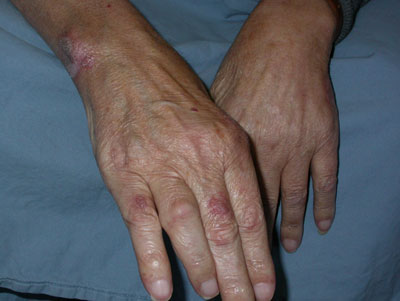Postal address: Enheten för yrkes- och miljödermatologi, Lund University, SE-205 02 Malmö, Sweden
Visiting address: Skåne University Hospital (SUS) Malmö, Jan Waldenströms gata, Entrance 73, 5th floor
Web page: http://www.lu.se/lucat/group/v1000484

 Contact person: Professor Magnus Bruze, phone: +46 (0)40 331760
Contact person: Professor Magnus Bruze, phone: +46 (0)40 331760
South Asia related activities
Professor Magnus Bruze has since more than a decade contact with leading Indian dermatologists within the areas of contact dermatitis and occupational dermatology. His main Indian collaboration partners are Professor Hemangi Jerajani, Department of Dermatology, Lokmanya Tilak Municipal Medical College, Mumbai; and Professor Kaushal Verma, Department of Dermatology and Venereology, All India Institute of Medical Sciences (AIMS) in New Delhi.
In the spring of 2012, the Swedish Council for Working Life and Social Research (FAS) announced a special call for proposals for arranging workshops/hearings to explore future research co-operation specifically with India. Professor Magnus Bruze was granted SEK 278 000 for a workshop on “Improved Diagnostics and Prevention of Occupational and Environmental Dermatoses in India”. See all FAS India related workshop grants from 2012.

 Workshop abstract: Dermatoses caused by exogenous hazardous factors are common all over the world. These hazardous factors are particularly common occupationally in low economy countries like India. The skin diseases have a great negative impact on the individuals suffering from these diseases from a quality of life perspective but also economically – not only for the individual but also for the employer and the society. A significant part of the exogenous hazardous factors are contact sensitizers which cause allergic contact dermatitis in million Indians. Unlike many other diseases allergic contact dermatitis can be prevented. A succesful prevention requires as first steps knowledge on the sensitizers causing the dermatitis and how to diagnose contact allergy optimally. Thereafter various measures can be initiated aiming at diminishing the exposure to the sensitizers by various means.
Workshop abstract: Dermatoses caused by exogenous hazardous factors are common all over the world. These hazardous factors are particularly common occupationally in low economy countries like India. The skin diseases have a great negative impact on the individuals suffering from these diseases from a quality of life perspective but also economically – not only for the individual but also for the employer and the society. A significant part of the exogenous hazardous factors are contact sensitizers which cause allergic contact dermatitis in million Indians. Unlike many other diseases allergic contact dermatitis can be prevented. A succesful prevention requires as first steps knowledge on the sensitizers causing the dermatitis and how to diagnose contact allergy optimally. Thereafter various measures can be initiated aiming at diminishing the exposure to the sensitizers by various means.
A planned workshop is tentatively set for 22–25 April 2013 in Malmö. It will focus on areas where there are major problems in India to see whether research collaboration is feasible within these areas. Suggested areas are cement dermatitis in construction workers, parthenium dermatitis in agricultural workers, textile dye dermatitis in workers dyeing synthetic textiles, dermatitis from hair dyes in hairdressers, and an improved patch test methodology.
The workshop may lead to joint applications för research funding, with an ambition primarily to fund common projects involving especially Indian PhD candidates.
The collaboration partners at the department are Assistant Professor Malin Engfeldt (chemist); Associate Professor Marléne Isaksson (dermatologist), Associate Professor Cecilia Svedman (dermatologist); and Associate Professor Erik Zimerson (chemist).
Assistant Professor Kristina Ryberg at the Department of Dermatology, Uddevalla Hospital, is also a member of the team.
In India, the planning is carried out by Prof. Jerajani and Prof. Verma, and a number of their collaborators.